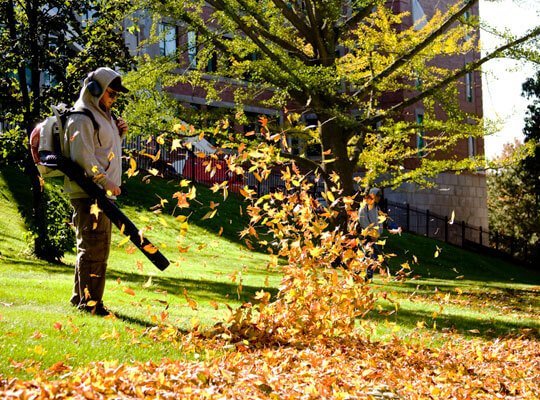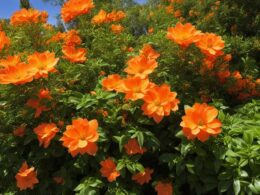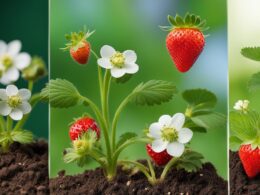Welcome to our article on Dutch clover lawns, the eco-friendly and low-maintenance alternative to traditional grass lawns. If you’re looking to enhance the beauty of your green space while minimizing your environmental impact, a Dutch clover lawn is the perfect choice. In this article, we’ll explore why clover is gaining popularity in lawn care, the benefits of incorporating clover into your lawn, how to add clover to your existing lawn, the best types of clover for your specific needs, and more.
Key Takeaways:
- Dutch clover lawns are eco-friendly, requiring less water, fertilizer, and herbicides compared to traditional grass lawns.
- Incorporating clover into your lawn helps reduce water consumption and prevents weeds, while also attracting pollinators.
- Clover lawns are low-maintenance and cost-effective, making them a sustainable choice for lawn care.
- You can mix clover with your existing lawn or seed a 100% clover lawn, depending on your preferences and climate.
- Dutch white clover and microclover are popular types of clover used in lawns, offering different characteristics and compatibility with turfgrass blends.
Why is Clover Gaining Popularity in Lawns?
Historically, clover was a common component of lawns due to its ability to fix nitrogen in the soil and improve overall lawn growth. However, the rise of synthetic herbicides in the 1950s led to a shift towards weed-free, turfgrass lawns, resulting in the decline of clover in lawns.
In recent years, there has been a resurgence of interest in clover lawns as homeowners seek environmentally conscious and low-maintenance lawn care options. Clover offers numerous benefits, making it an attractive choice for those looking to reduce their lawn care inputs and have a more sustainable approach to maintaining a green space.
One of the key benefits of clover in lawns is its reduced water consumption. Clover’s deep root system enables it to access water from deeper in the soil profile, reducing the need for frequent watering. This not only saves water but also makes clover lawns more resilient during drought conditions.
Another advantage is that clover eliminates the need for nitrogen fertilizer. It is a natural nitrogen fixer, meaning it converts atmospheric nitrogen into a usable form for plants, thereby promoting healthy growth without the need for synthetic fertilizers. This not only saves money but also reduces the risk of fertilizer runoff, which can harm the environment.
Furthermore, clover acts as a natural weed preventer. Its dense growth and low-growing nature prevent weed seeds from germinating and establishing in the lawn, reducing the need for herbicides. In addition to reducing chemical use, clover lawns are also pet-friendly, as they provide a safe and non-toxic environment for pets to play and explore.
Beyond these practical benefits, clover lawns are aesthetically pleasing and attract pollinators. The beautiful white or pink flowers of Dutch clover not only add color to your lawn but also provide a valuable food source for bees, butterflies, and other pollinating insects. By creating a clover lawn, you can contribute to the conservation of pollinators and support biodiversity in your yard.
Overall, the increasing popularity of clover in lawns can be attributed to its numerous benefits, including reduced water consumption, elimination of nitrogen fertilizer, weed prevention, and pollinator attraction. As more homeowners embrace environmentally conscious lawn care, clover is becoming a go-to option for achieving a beautiful, low-maintenance, and sustainable green space.
Benefits of Clover in Your Lawn
Clover lawns offer a variety of benefits that make them an excellent choice for your green space. Whether you are concerned about water conservation, want a low-maintenance lawn, or need a plant that can thrive in poor soil conditions, clover has you covered.
One of the key advantages of clover lawns is their ability to require less water compared to traditional grass lawns. This is due to clover’s deep root system, which allows it to access water from the soil profile effectively.
Unlike typical lawn grasses, clover stays shorter and does not require mowing unless you want to remove the flowers. This no-mowing feature makes clover lawns an attractive option for those looking for a low-maintenance alternative.
Clover is a resilient plant that can grow well in poor soil conditions. It has excellent heat and shade tolerance, allowing it to thrive even in challenging environmental conditions. Whether you have areas of your lawn that receive intense sunlight or areas that are shaded by trees, clover can adapt and continue to grow.
Winter hardiness is another advantage of clover lawns. In warmer climates, clover stays green year-round, adding vibrancy to your landscape. Additionally, clover can withstand cold temperatures and maintain its growth, making it an ideal choice for regions with harsh winters.
Choosing a clover lawn can also be cost-effective. Unlike traditional grass lawns, clover does not require nitrogen fertilizer as it has the unique ability to fix nitrogen from the atmosphere and convert it into a usable form for itself. This reduces the need for additional fertilizers, saving you money in the long run. Clover lawns also have lower maintenance costs due to their minimal mowing and watering requirements.
Clover lawns provide natural weed prevention by forming a dense ground cover, effectively crowding out potential weeds. This contributes to a healthier lawn and reduces the need for herbicides or other weed control methods.
Another benefit of clover lawns is their ability to reduce soil compaction. The deep root system of clover helps aerate the soil, improving its overall structure and reducing compaction. This leads to healthier soil and better overall lawn health.
If you have pets, clover lawns are a great choice. Clover is pet-friendly, and the soft texture of the leaves provides a comfortable surface for your furry friends to play and relax on.
Clover lawns are also beneficial for pollinator attraction. The flowers of clover attract pollinators such as bees and butterflies, helping to support the natural ecosystem and promote biodiversity in your garden.
In summary, whether you are looking to conserve water, reduce lawn care costs, improve soil health, or create an attractive habitat for pollinators, a clover lawn provides a multitude of benefits. Consider incorporating clover into your lawn to enjoy these advantages while maintaining a beautiful and sustainable outdoor space.
How Can You Add Clover to Your Lawn?
Incorporating clover into your lawn is a great way to enhance its aesthetics and environmental benefits. There are two methods you can choose from: mixing clover into your existing lawn or seeding a 100% clover lawn.
If you opt to mix clover into your existing lawn, you’ll create a beautiful blend of turfgrass and clover. This approach offers the advantage of maintaining some ground cover while allowing the clover to establish and green up. It’s a great option if you’re looking for a gradual transition.
On the other hand, you can seed a 100% clover lawn by removing your existing grass and introducing clover seeds. This method offers the beauty of a clover-dominant lawn. However, it’s important to note that seeding a 100% clover lawn may require more initial investment due to the higher cost of clover seeds.
The decision between mixing clover and seeding a 100% clover lawn depends on various factors such as personal preference, cost considerations, and climate. Consider how rapidly you want the clover to establish and the overall aesthetic you desire for your lawn.
Remember, both approaches have their own pros and cons, so make a choice based on what aligns best with your lawn care goals. Whichever method you choose, you’ll enjoy the benefits of a clover-enhanced lawn.
Best Types of Clover for Your Lawn
Dutch white clover (Trifolium repens) and microclover (Trifolium repens var. ‘Pipolina’ or ‘Pirouette’) are the two most commonly used types of clover in lawns. Dutch white clover, a low-growing variety, has a rich history in lawns before the popularity of weed-free turfgrass lawns. Microclover, on the other hand, is a smaller variety with improved characteristics that make it a popular choice.
Microclover offers better tolerance to foot traffic and has the ability to blend well with various turfgrass species. This makes it an excellent option for maintaining a lush, green lawn without sacrificing the aesthetic appeal. It can be seamlessly integrated with turfgrass blends such as fescues, Kentucky bluegrass, and perennial ryegrass, providing a beautiful, resilient lawn.
When selecting the type of clover for your lawn, it’s important to consider factors like climate, desired height, and compatibility with turfgrass blends. Dutch white clover and microclover are both versatile options that can adapt to different environmental conditions and complement a variety of grass species. You can choose the type that best suits your lawn’s specific requirements and preferences.
Conclusion
In conclusion, a Dutch clover lawn is a fantastic choice for those looking to transform their green space into an eco-friendly and vibrant oasis. By opting for a clover lawn, you can enjoy numerous benefits that contribute to sustainable lawn care practices. One of the major advantages is water conservation, as clover lawns require less water compared to traditional grass lawns. This not only helps to conserve a precious resource but also reduces your water bills.
The low-maintenance nature of clover lawns is another key benefit. Unlike typical grass lawns, clover stays shorter and does not need frequent mowing. This saves you time and effort while still maintaining an attractive and well-kept lawn. Additionally, clover lawns are cost-effective as they do not require nitrogen fertilizer and have a reduced need for herbicides.
By reducing the need for water, fertilizer, and herbicides, clover lawns contribute to sustainable lawn care practices. This eco-friendly approach helps to protect the environment by minimizing the use of chemical inputs, promoting healthier soil, and supporting pollinator populations. Clover lawns not only benefit your immediate surroundings but also play a part in creating a more sustainable future for our planet.
Embrace the trend of Dutch clover lawns and reap the benefits of a beautiful, low-maintenance, and environmentally conscious green space. Whether you choose to mix clover with your existing lawn or seed a 100% clover lawn, the choice is yours. Whichever path you choose, a clover lawn is sure to make a positive impact on your outdoor living experience.











